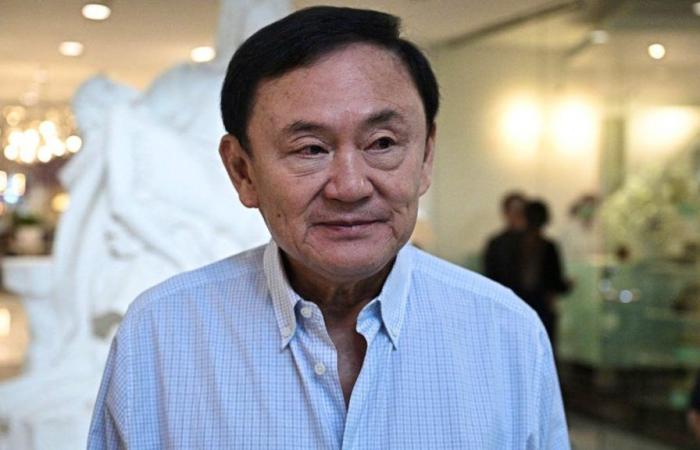Former Prime Minister Thaksin Shinawatra in Bangkok, June 5, 2024.
AFP
Former Thai Prime Minister Thaksin Shinawatra was released on bail on Tuesday in a lese majeste case with high political sensitivity in a kingdom accustomed to crises. The 74-year-old billionaire left a Bangkok court after posting bail of 500,000 baht (the equivalent of 12,100 Swiss francs), the judges said in a statement.
The former leader, who fled the country in 2008 to escape old convictions relating to his years in power (2001-2006), is not allowed to leave Thailand unless agreed of justice, it is specified. The next hearing is scheduled for August 19.
These prosecutions recall old fractures in Thailand, between the Shinawatra clan, supported by the rural and poor communities of the North and Northeast, and the military-royalist establishment of Bangkok, attached to the status quo. They opened a new chapter of uncertainty in a kingdom shaken by cyclical crises, between giant demonstrations sometimes punctuated by violence, army interventions and contested court decisions.
The main opposition party and the Prime Minister, from the ranks of the Shinawatra movement, are also the subject of legal proceedings, which are parasitizing the debates and keeping the bloc historically hostile to conservative elites under pressure. Thaksin Shinawatra’s charge of lese majeste is based on statements made in 2015 during an interview in South Korea, a few months after an army putsch against his sister, Yingluck Shinawatra.
Stifle any protesting voice
Thaksin Shinawatra denies the accusations, his lawyer Winyat Chatmontree assured Tuesday. The former leader had “no intention of mentioning people protected by article 112 (which governs royal defamation, editor’s note),” insisted his counsel. He is also being prosecuted for violating the Computer Crimes Act, which carries up to five years in prison.
In Thailand, the lese majeste law, considered one of the harshest in the world, exposes defendants to sentences ranging from three to fifteen years of imprisonment. This text was misused to stifle any protest voice for political purposes, in the wake of the giant demonstrations of 2020 and 2021 demanding an in-depth overhaul of the monarchy, human rights groups have denounced in recent years.
Since the popular protests, more than 270 people have been prosecuted for lese majeste, according to a group of Thai lawyers. Thaksin Shinawatra returned to Thailand last August, at the cost of a secret pact with his former rivals, according to experts.
Barely returned from fifteen years of voluntary exile, he benefited from a royal pardon which reduced his prison sentence from eight to one year. But he only spent a total of six months in detention, most of which was in a Bangkok hospital due to his state of health and his age.
“Buffer”
In exchange, the party controlled by his family, Pheu Thai, would have agreed to form a government coalition with pro-army groups, at the risk of betraying some of its commitments made during the campaign.
Thaksin Shinawatra is “somewhere between a political strategist and a hostage,” said political analyst Napon Jatusripitak. “It continues to be used as a buffer by the establishment against grassroots pro-democracy movements,” he continued. He remains an influential figure, although Pheu Thai has been overtaken by the more radical Move Forward as the main opposition party. Move Forward, winner of the last legislative elections, is threatened with dissolution, in another case before the Constitutional Court, a body involved in several of the latest political crises that the kingdom has experienced.
The pro-democracy movement is accused of having promised during the campaign to want to reform the lèse majesté law – an action which also falls under the lèse majesté law.
The Constitutional Court, which dissolved Thaksin Shinawatra’s former party in 2007, indicated on Tuesday that it would meet again on July 3 to discuss the case. Further deliberations are expected on July 10 regarding Prime Minister Srettha Thavisin, accused of having violated ethics rules by appointing a minister convicted by the courts. The leader risks eviction.
(AFP)






